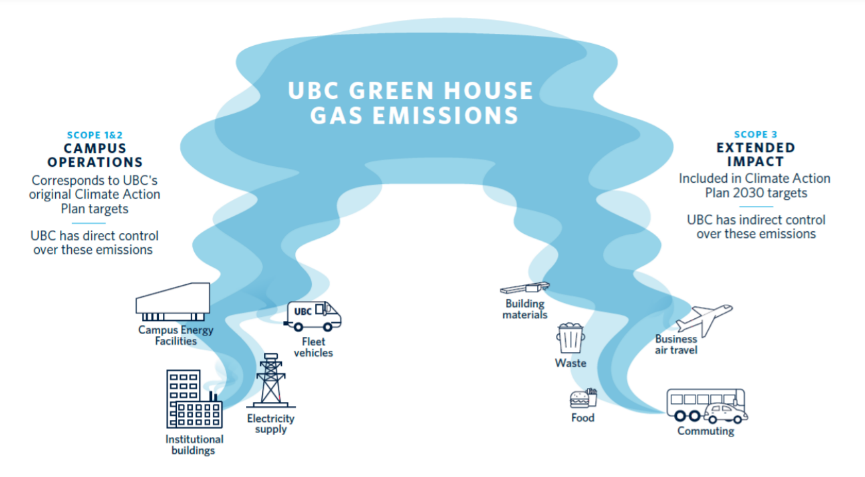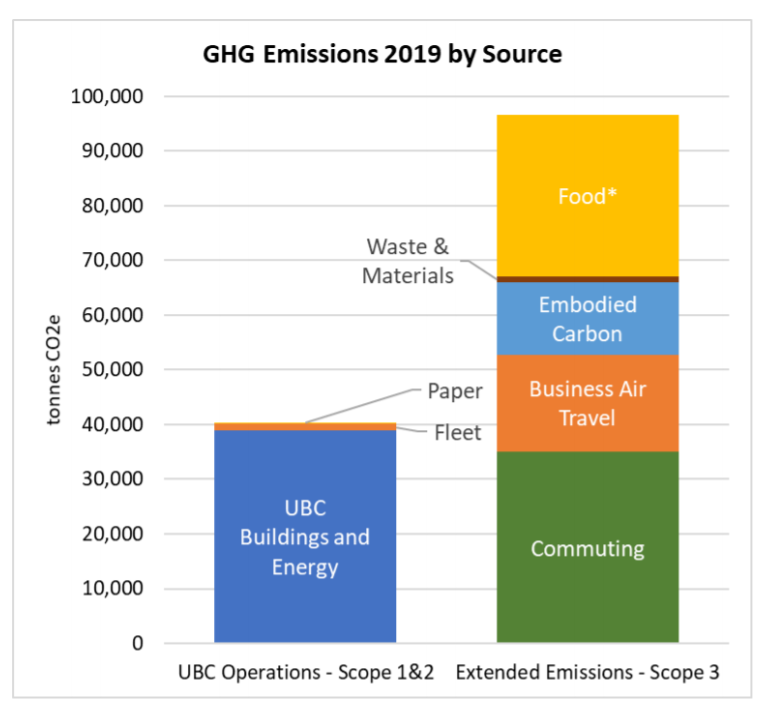UBC is bringing climate protection to action with a new plan that sets out ambitious targets for combatting climate change, including climate-neutral status on both of its campuses within nine years.
A direct reaction to the commitments outlined in UBC’s Climate Emergency Declaration, the Climate Action Plan 2030 (CAP 2030) sets its sights on achieving the goal of a no-higher-than-1.5 °C temperature increase set out in the Paris Agreement. In so doing, UBC aspires to become a role model in climate protection for other universities around the globe.
What can you do?
There are many ways to get involved. Your individual participation is important, because campus operations cause only a fraction of the overall greenhouse gases (GHG) emissions produced at UBC. The biggest contributions are made by what is known as “extended impact.” This includes food choices, waste products, and student, staff and faculty commuting. Our everyday choices have a major impact on UBC’s GHG emissions.
 Climate change and the LSI
Climate change and the LSI
To get deeper insight into what all of this means to the Life Sciences Institute, I spoke with Maxi Kniewasser, who is the Climate Action Planner for the CAP 2030 process.
Interestingly, the Life Sciences Center (LSC) is particularly challenging when it comes to making the UBC campus carbon-neutral: “The Life Sciences and Pharmacy buildings are by far the biggest energy consumers after our district energy systems, which provide energy for the entire campus. These two buildings are almost like stand-ins for light industry, in terms of their energy consumption,” says Kniewasser.
Sustainability and the LSI
The LSC also requires large amounts of steam, to keep humidity levels within the building at a reasonable level. “Because of this, lab buildings are much trickier to decarbonize than other buildings,” Kniewasser adds. As it is difficult to electrify steam generation, Renewable Natural Gas, which could be produced in a carbon neutral way, is a potential direction to explore.
One way that LSI researchers can contribute to the CAP 2030 goals is by conducting research on sustainability-related topics. Kniewasser, asked which research projects at the LSI he would like to see more of in the future, said: “Biofuels from algae are a really promising initiative. UBC has expertise in all the different areas to make this happen.” The usage of algae could be an opportunity to do carbon-capturing, while simultaneously creating biofuels. “This is a science-based opportunity that UBC is well placed for.”
The use of microalgae for the production of renewable resources is work I am personally involved in, working in the lab of Dr. Steven Hallam. I’d like to highlight other sustainability-oriented research projects ongoing in the LSI including the lignin research conducted by Drs. Bill Mohn and Lindsay Eltis, Dr. Sean Crowe’s work on microbial biomineralization, and Dr. Tom Beatty’s work on fuel cells based on bacterial photosynthesis. All of these may help us long term in tackling climate change.
When I asked John “Nomo” Nomellini, one of the wing managers at the LSI, what he’d like to ask the LSI members to change concerning sustainability, he had a clear opinion about this: “I wish everyone was involved enough to know the location of specific recycling, and if there is any prep work needed before dropping off recycling.” This is any easy way that each of us can help contribute to making recycling more efficient at the LSI.
 A tight deadline
A tight deadline
Considering the short time remaining before UBC’s carbon neutral deadline, and the impact of “extended emissions,” an obvious question to ask is if there should be more stringent requirements in place. “There are limits to what the UBC can do,” says Kniewasser. “These are not our emissions. We have some control, but not all.”
To reach into this space, the University could take a carrot and stick approach. An example of a carrot could be discounts on plant-based products, compared to meat-based dishes. In Kniewasser’s opinion, overly stringent regulations would be both difficult to monitor and to ensure compliance.
Though the challenges might feel overwhelming, Kniewasser still keeps a positive attitude. “To me, it seems to be the most optimistic time on this file, because we’re finally making progress in our transformation towards carbon-neutrality, in contrast to recent decades.”
Let’s all harness increasingly global momentum around climate change – to make CAP 2030 a success and UBC a role model for a sustainable university.
Sustainability Update by: Dr. Moritz Koch
